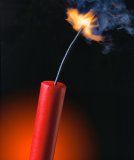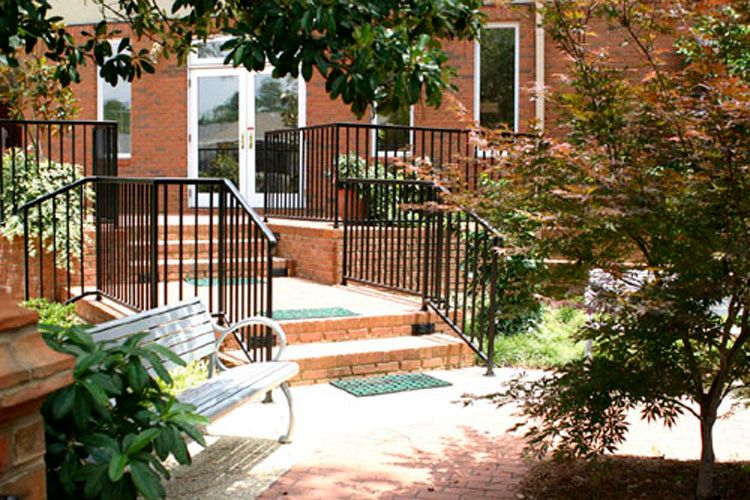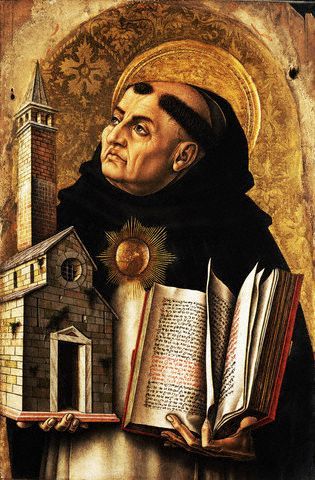
When most people hear “anarchist,” they think violence, maybe rage, maybe disruptive attempts by groups like Weatherman to overthrow the United States government in the 1960s. People with a literary bent might think of the dynamite-toting Russian anarchists that Fyodor Dostoyevsky satirized in The Demons.
A person might also think “atheist.” Libertarians tend to be atheists or agnostics, including the pioneers of libertarian thought, Ludwig von Mises and Friedrich Hayek. The acrimonious libertarian Ayn Rand once told Bill Buckley, “you are too intelligent to be-leef in Gott.”
But there's a strain of libertarianism/anarchism emerging that is neither violent nor atheistic. It preaches anarchism because it wants peace. It wants peace because it's Catholic. It's steeped in the philosophy of Aristotle and Thomas Aquinas.
Some refer to this strain of thinking as “natural law anarchism,” or “natural law libertarianism.” Such terms might seem oxymoronic, but it's gaining considerable interest.
In the Deep South

Auburn University in Alabama might not seem like a place to find a group of thinkers dedicated to the natural law and economics, but they have been there for a quarter century now, at The Ludwig von Mises Institute.
Lew Rockwell started the Institute in 1982. The reason he chose Auburn University was simple: at the time, there were a lot of Austrian economists at Auburn. The Institute is wholly independent of Auburn University, but there is a working relationship.
Although the Institute is not a Catholic organization, Catholic-like thinking pervades its publications and thinking. Its founder Lew Rockwell is Catholic, its Editorial Vice-President, Jeffrey Tucker, has expertise in sacred music and Gregorian chant, and their newest Fellow, Thomas Woods, is Catholic and author of How the Catholic Church Built Western Civilization.
The Institute doesn't track employees' religious affiliations and it has many non-Catholics on staff, but even among the non-Catholics, natural law thinking is the norm. Murray Rothbard, one of the Institutes' favorite thinkers, was agnostic, but he had little use for Martin Luther and firmly believed in the natural law.

Some say the Austrian tradition of economics is the Catholic tradition of economics. It starts with St. Thomas Aquinas, possibly even earlier. The great thinkers in the Austrian line of thought were mostly Catholic: the great scholastic Francisco de Vitoria, Frederic Bastiat, Jean-Baptiste Say, and many others. Even the late nineteenth-century godfather of Austrian economics, Carl Menger, was Catholic, though Hitler tried to prove he was Jewish in order to discredit Austrian economics.
Most people aware of The Ludwig von Mises Institute have stumbled across it through its popular website, Lew Rockwell dot Com, which the Internet-tracking site Alexa ranks as one of the top 15 political websites in the world. Said one Lew Rockwell contributor, "The viewpoint you will find at Lew Rockwell dot Com is a universal viewpoint. It doesn't like the modern nation-state because it results in discord, from the religious wars of the seventeenth century to America's nationalistic and hubristic foreign policy today."
“Combine the insights of the Austrian economists with the ancient moral imperative of subsidiarity,” once wrote Lew Rockwell, “and you end up with Murray Rothbard's dictum: universal rights, locally enforced. This is where we should be heading, and not toward world government, in this period of nation-state decay.”
A Better Way?
It's too early to predict the results of the 2008 elections, but one thing is clear: Many, if not most, Americans don't like the choices.
And though many people are fed up with big government, they don't think they have a choice. Democrats have pushed big government since at least Franklin Delano Roosevelt. The Republicans rode the mantra of “limited government” to control Congress in 1994, then promptly failed to deliver.

It's not surprising to the thinkers at The Ludwig von Mises Institute. One of their favorite thinkers is the libertarian Albert Jay Nock, a man who railed against the New Deal and other forms of big government. Nock wrote in 1935, “If your country is ruled by a state, it doesn't matter what political party is in power. Both parties are merely going to abuse the power for their own benefit. It's inevitable.”
For people who feel the Republicans betrayed their supporters after 1994 and Bush's election in 2000 and 2004, these words ring prophetic. The same people, however, aren't ready to vote for the Democrats.
What Can Be Done?
An increasing number of people are calling for America to go back to its roots, to question how the United States arrived at the world of trillion-dollar deficits, incessant foreign wars, and cradle-to-death welfare.
Impossible? Maybe, but a group of natural law thinkers in Auburn, Alabama, are keeping the faith and pushing the ideological envelope, urging Americans to think outside the cliches offered by America's two-party lock box system and to look for a better way.
Most American Catholics won't agree with everything they say, but many will find their approach different and maybe even refreshing.
_____
From the "Articles That Got Away" archives









